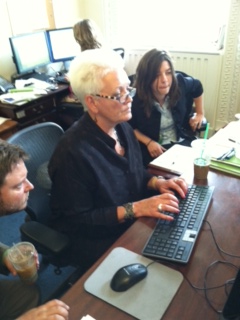
Last week, Gayle Smith, Special Assistant to the President and Senior Director for Development and Democracy for the National Security Staff, participated in a live Twitter interview, answering questions submitted via Twitter and compiled by @ONECampaign.

Gayle Smith, Special Assistant to the President and Senior Director for Development and Democracy, participates in a Twitter Interview with the ONE Campaign. July 22, 2011.
There were a lot of great questions, and because we couldn’t get to all of them, Gayle answered a few additional questions as a follow-up to the chat:
Question: @BldgTomorrow Building Tomorrow: @ONECampaign Is education a priority for development and how is this being pursued through our relationships w/other nations?
Gayle Smith:
Global education has long been a critical component of our development efforts – we all have an interest in supporting quality education opportunities for all of our children. Consistent with the President’s Global Development Policy, we’re investing our resources strategically to achieve measurable and sustainable educational outcomes through enhanced selectivity, focus, country-led programming, division of labor and innovation. USAID’s recent education strategy highlights our plan, which places a high premium on investments based on evidence based analysis to inform our work on 3 focused global education goals. With our partners, we have impressive gains to show for investments to date in promoting access to education for all children, but there remains much more to do, including to focus more on quality and relevance of learning. I would encourage you to read more about our strategy.
Question: @nadeemhaque Nadeen Haque: @ONECampaign the way aid is given now, has any one studied it's value? Is there a better model?
Gayle Smith:
There are many models of aid delivery but importantly, there are many more tools we are working to employ as we partner with countries to support sustainable development. We placed a premium on evidence-based lessons the world has learned as we were working with the President on his global development policy, in which aid is an important but not the only component of our development efforts. For example, we know there are many ingredients to creating conditions for countries’ sustainable growth.
It’s about encouraging entrepreneurship. Strengthening democratic institutions. Working to forge inclusive governments that reflect the diversity of their societies and are accountable to their people. We are partnering with countries to support such broad-based economic growth, which will be transformational in their own countries and critical to global prosperity and security far beyond their borders – including within our own.
Question: Guadalupe Ramirez: USC How are programs such as Peace Corps and other global citizenship opportunities changing the face of development?
Gayle Smith:
Programs such as the Peace Corps are critical to the people-to-people connection of development, which is about much more than one nation delivering assistance to another. PC and other programs work to promote better understanding for both countries, and offer a face to the American values represented in our development efforts and work with other countries. Importantly, PC has continued to change and evolve as the world has done since its inception in 1961. Volunteers continue the work of teaching and bringing clean water to communities, but they also address issues like HIV/AIDS awareness, promote business development, and work on information technology – all of which is helping to reflect a change from delivery of assistance to partnership for development.
Question: @mvfazzino @ONECampaign:Why should the US fund #vaccines used in the developing world? What proof do we have they're working?
Gayle Smith:
We believe that vaccines are one of the most proven and cost-effective life saving investments for the world’s children, and that’s why we recently made tough choices and trade-offs within our current health portfolio to make a multi-year commitment to the Global Alliance for Vaccines and Immunizations (GAVI). Our investment was just one of many financial commitments – many of which were far larger than our own – so that our pledge was multiplied into billions of dollars in commitments, all to help get more vaccines to more children to protect them against pneumonia and diarrhea, the world’s two most potent childhood killers. In turn, all of these commitments combined have enabled vaccine manufacturers to announce major price reductions for new vaccines, so that more children will have access to these critical life-saving vaccines.
Question: @Menjia_Rose Margaret A.T Johnson: @ONECampaign How is it that our government can focus on foreign aid & development, rather than the urgent matters here in the US
Gayle Smith:
Our government is focused on both because we know that pursuing our development objectives is essential to advancing our own prosperity and security here in the U.S. In this global economy, our work to help strengthen our global partners helps us to build a stable global economy, advance democracy and human rights, and enable us to be better able to deal with a range of threats that know no borders, including diseases that can travel unchecked and affect us here at home.
Question: Catherine Kustanczy: how do you balance the need for aid with the importance of self-sufficiency?
Gayle Smith:
This is a very good question. Our work on development is and should be about more than just aid – it’s about partnership with countries to help move them from poverty to prosperity. Recall President Obama’s speech in Ghana where he emphasized the important role countries themselves play in their own paths to development. Our approach to development is predicated on the transformational change aspect to development – that no country wants to be dependent on another. To that important end, we are working to harness all of the tools at our disposal, including aid but also our trade and investment policies, to support countries in their own path to prosperity and to create the global conditions where assistance is no longer needed.
Also, don't miss the full Twitter Q&A below or over on Storify.


